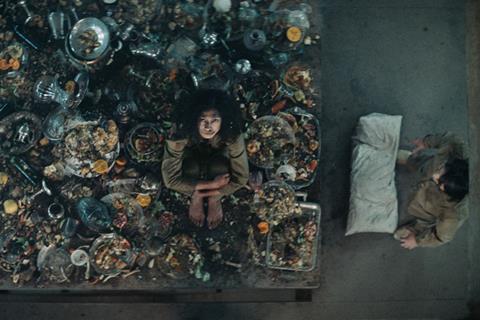An inventive sci-fi satire set in a futuristic prison delivers some nasty thrills

Dir: Galder Gaztelu-Urrutia. Spain. 2019. 94 mins.
Proponents of “trickle-down economics” have always insisted that tax cuts lavished on the one-percent eventually reach the other 99. The Platform, an acerbic Spanish thriller, turns that optimistic theory into a literal hell. Set in a dystopian world of heartless self-interest where life is dog-eat-dog – and perhaps, if things get much worse, man-eat-man – the film delivers its mostly misanthropic message with grubby detail and gruesomely bloody violence. Part Swift, part Saw, and determinedly grim, this Toronto premiere is sure to become a cult favorite of similarly uncompromising horror fans, although its mood could be too dark for mainstream success.
Part Swift, part ’Saw’
The basic concept is a bit like Snowpiercer, but from another angle: in this unnamed institution, hundreds of cells are stacked one on top of each other, two inmates to a unit. The location of the cell changes monthly, moving up, down or saying the same. The truly crucial detail, however, is that a single, grand, gourmet feast is prepared daily for all the inhabitants, and then lowered via a floating platform, giving each level only a few minutes to eat. Those at the top dine on roast meats, rich cakes, and wine. Those at the bottom get bones, crumbs, and broken bottles.
As social satires go, The Platform isn’t going to win any prizes for subtlety. Yet while there are few ambiguities in David Desola and Pedro Rivero’s script, there are a number of strong characters. True, some of them stand a bit too neatly along clear-cut political lines; there is the angry revolutionary advocating armed struggle, the liberal pacifist who only wishes everyone would share. But then there are more complicated inmates like Zorion Eguileor’s Trimagasi, an elderly man stubbornly clinging to life (and to a large butcher knife). And Iván Massagué’s Goreng, a mournful intellectual who seems the least likely to survive this place – until he finds a larger purpose.
The reason Trimagasi is armed is that a peculiar regulation allows each prisoner to keep one personal possession; certainly no one can accuse the old man of being impractical. Goreng’s keepsake? A copy of Don Quixote. It’s an odd choice, but then Goreng is an odd inmate, because he actually asked to be here. Apparently, by volunteering to do time in this hellhole, you can accumulate certain emblems of social status; Goreng has been promised an advanced college degree when he leaves. Although perhaps that should be “if” he leaves. Because nothing is certain here, except inequality, brutality, and hunger – all of which will eventually lead to a murderous climax.
The film takes a while to get there under Galder Gaztelu-Urrutia’s occasionally faltering direction of his debut feature. Although the story’s point is clear, the plotting is thin, and it can be easy at times for viewers to feel as confined as the prisoners. But the production design – all grey cement walls, with that platform cutting through the center of the screen like an infernal dumbwaiter – is superb. Massagué, who has the haunted hawklike look of the character actor Timothy Carey, is terrific as Goreng. And the movie’s message, however simple it may be, is definitely hard to ignore. Even as much as we might want to try.
Production companies: Basque Films, Mr. Miyagi Films, Plataforma La Película A.I.E.
International sales: Latido Films. US sales: XYZ Films/CAA
Producers: Carlos Juárez
Screenplay: David Desola, Pedro Rivero
Production design: Azegiñe Urigoitia
Editing: Haritz Zubillaga, Elena Ruiz
Cinematography: Jon D. Domínguez
Music: Aranzazu Calleja
Main cast: Iván Massagué, Antonia San Juan, Zorion Eguileor, Emilio Buale, Alexandra Masangkay






![The Brightest SunScreen[Courtesy HKIFF]](https://d1nslcd7m2225b.cloudfront.net/Pictures/274x183/3/5/0/1448350_thebrightestsunscreencourtesyhkiff_312678.jpg)















![The Brightest SunScreen[Courtesy HKIFF]](https://d1nslcd7m2225b.cloudfront.net/Pictures/100x67/3/5/0/1448350_thebrightestsunscreencourtesyhkiff_312678.jpg)

